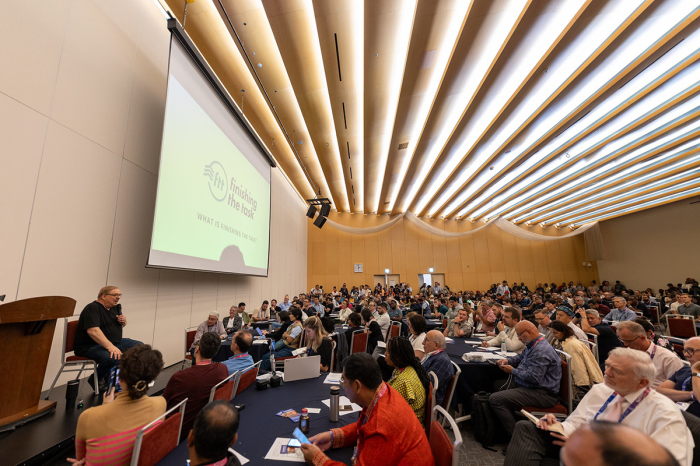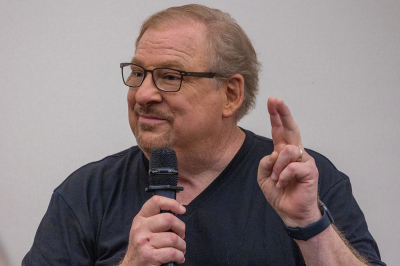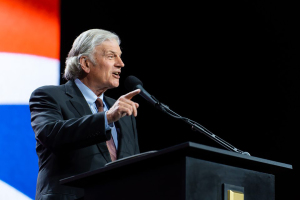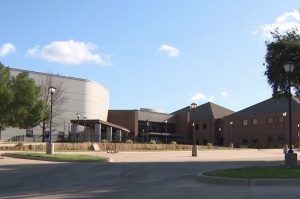Rick Warren at Lausanne 4: ‘Part of finishing the task is re-evangelizing the Church’

INCHEON, South Korea — Ahead of his speech Saturday at the Fourth Lausanne Congress on World Evangelization, Rick Warren, founder of Saddleback Church in California, warned believers must re-evangelize nominal Christians to fulfill the Great Commission, adding that some Christians have traded "spiritual power for political influence."
Speaking to a select group of delegates about the obstacles impeding Christians from fulfilling the Great Commission, the 70-year-old Warren said the Great Commission can be fulfilled, but it first requires "the great collaboration." And there are two obstacles faithful believers must overcome to finish the task.
Christians, said Warren, are great at fellowshipping and networking, but they're terrible at collaboration and unity — a word that has been at the heart of Lausanne 4 this week.
"The purpose of unity is not for unity's sake. The purpose of unity is for evangelism," said Warren, who retired from Saddleback in 2022 and has committed to focusing the next 10 years of his life on helping younger generations reach more people for Christ.
Warren emphatically stressed to the delegates gathered at the "Finishing the Task" breakout session on Tuesday afternoon that there "will be no Great Commission fulfilled until we actually get this unity thing figured out."
Unity was immensely significant to Jesus as well, he added. In Jesus' final prayer before He goes to the cross, do you know what Jesus was most concerned about? That we be unified. Twice in his final prayer, John 17, He prays this: 'Father, I pray that they will be one so that the world may know.'"
Other than occasional collaborations on events, the structure currently in place for evangelism entails Christian denominations and organizations working independently of one another.
"Nobody's ever going to be able to do it on their own," he added. "You can't do it on your own. I can't do it. Your denomination, your agency can't do it on their own."
Just as the Lausanne Movement Global Executive Director Michael Oh said in his message to the 5,000 delegates gathered Sunday night, the inability or refusal to collaborate hurts the Christian witness and the fulfillment of the Great Commission.
The second reason why Christians aren't collaborating with one another to urgently finish the task, according to Warren, is because they "really don't believe Jesus is coming back" in their lifetime.
Warren admonished this type of thinking, noting that first century Christians believed Jesus could come back at "any moment," and because of this urgency, it spurred them to action, and the Church witnessed exponential growth.

"If you really thought that Jesus could come back in your lifetime, you would be collaborating with everybody," Warren said, pointing to Jesus' words in Matthew 25, where He says three times to "be ready."
Imploring believers to get a conviction about the Second Coming of Christ, he warned, "If you're not ready now, you are disobeying the Lord Jesus Christ."
Another reason why the first century Church quickly grew was because they were suffering persecution. But once Christianity became legal and popularized in the Roman Empire, then "political power replaced spiritual power," he said.
"Christian churches actually grow faster under persecution," Warren explained. "We were illegal during the fastest period of growth. The fastest period of growth of Christianity was the first 330 years of the Church. We went from 120 people in the upper room to, by [the year] 360 AD, half of the Roman Empire had been saved — 30 million out of 60 million people.
Sharing an example of Christianity's rise to prominence and what he described as a monumental cultural shift, Warren said the Roman denarius from the year 87 had Caesar on the coin. By the year 300, Chi Rho, the first two letters of Christ in Greek, was on the coin. By 340, Jesus was on the denarius, and by 360, the cross of Jesus Christ was on the coin. "Now, that's culture change," he said.
Reflecting on how, once "Christianity became an acceptable political power" in the Roman Empire, "miracles, signs and wonders" declined, Warren surmised that "all of the signs and wonders of the first 300 years were because we had no political clout."
"I wish I could say this to the people in my country, in America, because they've switched spiritual power for political influence," he lamented, warning Christians not to "hitch their wagon" to any politician because that kind of power is fleeting.
Re-evangelizing the Church
Warren said another highly significant part of fulfilling the Great Commission is re-evangelizing the Church. What this means is reaching out to nominal Christians to get them on fire for God so they can, in turn, be prepared and ready to reach and disciple others.
Listing statistics on the number of Buddhists, Hindus, Muslims, Jews and Christians worldwide, Warren underscored that there are some 2.6 billion people worldwide who identify as Christian, and many of them need to be re-evangelized.
"There are nominal Christians just like there are nominal Muslims who don't know what they believe," he said. "But the bottom line is it's a whole lot easier to evangelize and reawaken a nominal Christian in name only than it is to win a Hindu who you're trying to convince the guy who believes in 10,000 gods to just believe in one.
"So part of finishing the task, completing the Great Commission, is evangelizing the Church. … If we were to evangelize and activate those people, if everybody who already claims to believe in the Trinity and the cross of the resurrection shared their testimony with somebody who'd never heard three times in the next 10 years […] we'd cover the entire world. It's not rocket science."
Following Jesus' model
Highlighting the numerous ministry success stories of Saddleback Church, which includes being the "only church in Christian history to plant a church in every nation (197 countries)," Warren said he didn't follow an American model or a strategy of his own making, he followed Jesus' model.
One thing Jesus does, Warren said, is He meets people where they are, not where He wants them to be. But He also doesn't "leave them there." He added that Christians must first learn how to "make friends" before they can share their faith and win people for Christ.
"So, as a pastor, as a leader, you have to teach people how to build friendships before you teach them how to share their faith," continued Warren, who said it has been the "privilege" of his lifetime to "train over 1 million pastors in 165 nations."
"My definition of evangelism is you build a bridge of love between your heart and theirs, and then Jesus walks across. […] Before people trust Jesus, they've got to trust you. And if I can't trust you, why should I trust your Savior."
Using himself as an example of gaining people's trust through actions and character, Warren stated earlier in his talk that he's among the pastors who have "never had a scandal" in his life. He shared that he was able to stay scandal-free by doing three things: living life with integrity, humility and generosity. "Those three things, he said, have been the "antidotes to the lust of the flesh, the lust of the eyes, and the pride of life."
Following Jesus' model, he continued, is simply following 2 Timothy 2:2, which is about teaching and passing down what was learned to successive generations of faithful men and women who are obedient to sharing the Gospel.
Another crucial aspect of modeling Jesus is prayer. As the disciples watched Jesus, "they realized that the secret to His power was His prayer life," Warren explained. "They never said, 'Lord, teach us how to heal people.' They said, 'Lord, teach us to pray.' Why? Because they recognized that's where the power came from."
Warren added that it's about "moving from member of the Body of Christ to maturity in the Body of Christ to ministry in the Body of Christ to mission in the world."





























